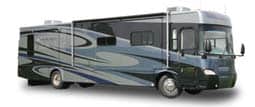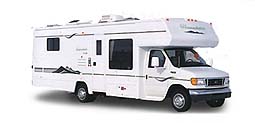If you’re looking at a 22,000-pound Class A motorhome and wondering, “Are they really gonna let me drive this thing?” then you’re not alone!
When purchasing a motorhome or renting an RV, three common questions are:
- Do I need a special license to drive an RV?
- Which RV class needs a special license?
- Do I need a CDL to drive a Class A motorhome?
You may even be wondering if you need a specialty CDL or other certification. Or can you really just drive an RV with a regular car license?
Here’s the simple answer:
Generally, no, you don’t need a special driver’s license to drive an RV.
According to current laws across all 50 states, if your motorhome weighs less than 26,000 pounds or your trailer weighs less than 10,000 lbs, you do not need a special license to operate.
Some of the product links are on this page are affiliate links. If you click through and purchase, I may receive a small commission at no extra cost to you. See Privacy Policy. Thanks!
Table of Contents
Do I Need a Special License to Drive an RV?
If you’re curious about RV driver’s license requirements, one of these pages might help you, too!
- Buying an RV
- Renting an RV
- Travel Trailer Towing Weight Calculator
- Fifth Wheel Towing Weight Calculator
Check out RV Share if you want a rent an RV from local owners like yourself.
That means unless you’re the pilot of a Class A motorhome the size of a tour bus, you’re probably exempt from RV license requirements. Class A’s can weigh as little as 12,000 pounds to as much as 30,000+!
Thankfully, almost no Class B or Class C motorhomes weigh more than 26,000 pounds. Most Class C’s weigh 12,000 – 12,000 pounds; Class B’s, even less.





Most towables weigh less than 10,000 pounds. However, some destination trailers, park models, luxury fifth wheels and mega-sized toy haulers exceed that limit.
If you exceed the limit, then in most states:
- You need a Class B license for a single-vehicle over 26,000 pounds
- A Class A license (universal CDL) to drive a combination of vehicles that weigh over 26,000 pounds
There is a difference between a commercial and non-commercial license (more on that later).
Please remember! The weight is based on the actual towed weight and/or GVWR (sometimes whichever is greater), not necessarily just the GVWR or factory weight!
If your camper trailer weighs 8,700 pounds dry and you add 1,500 pounds of gear, your towable rig now weighs 10,200 pounds and you would be required to possess a special license in many states!
Wondering how much your camper weighs? If you don’t own an RV yet, you can get a good idea of common weights at the article, “How Much Do Campers (Actually) Weigh?”
RV Driver's Licensing FAQs
What About Maximum Length and Width of an RV?
Generally, driving or towing excess weight requires a special license. Driving or towing an excessive size may require a special permit.
All states have rules regarding the maximum length of bumper-pull, fifth wheel and gooseneck trailers in addition to rules regarding maximum length (tip-to-tail of combined vehicles).
States also have rules regarding maximum height and width. In fact, these limits can even change by road type! In some states, the maximum height on the Interstates and major highways is 14 feet, but in other areas the maximum height may be just 13.5 feet. In older areas of the country where low urban underpasses are common, individual roads may limit height to less than 10 feet!
In mountainous areas, many roads have maximum size stipulations because of tight road turns, narrow lanes, low tunnel ceilings, and extended steep grades. Remember, just because your truck was rated for “9,000 lbs towing capacity” doesn’t mean it can tow 9,000 lbs charging up a hill at 55 mph!
So in addition to understanding licensing requirements, you should double-check that your rig doesn’t require an oversize permit and special routing!
You should read our guide to driving an RV for the first time, where we dissect restrictions about RV width, height, length, and weight!
Again, thankfully, oversize RVs are somewhat rare. However, exceptionally large motorhomes, fifth wheels, park models, and travel trailers may fall outside the norm.
If your towable camper is wider than 8′, taller than 12.5′, or longer than 32 feet, you should carefully plan your route and double-check state and local route restrictions and conditions! You may be required to obtain an oversize permit.
Also, if your combined tow vehicle + trailer length is greater than 60 feet, you should carefully plan your route and double-check state and local route restrictions and conditions! You may be required to obtain an oversize permit.
If your motorhome RV is wider than 8′, taller than 12.5′, or longer than 40 feet, you should carefully plan your route and double-check local and state route restrictions and conditions! You may be required to obtain an oversize permit.
For a full list of size restrictions by state, see the AAA Digest of Motor Laws.
It is important to understand that licensing requirements are set by states! If you have questions, please speak directly with your state Department of Motor Vehicles.
If you’re driving a “schoolie” bus conversion capable of carrying more than 16 passengers, you may be required to possess a special driver’s license as well.
To learn more about the different types of RVs and campers, visit our RV types guide here!
RVIA Advocacy for Driver Requirements
You can thank the Recreational Vehicle Industry Association (RVIA) for making the RV lifestyle so accessible. Here’s what RVIA advocates:
The RV Industry Association opposes any additional requirements other than a car driver’s license to operate an RV.
RVIA goes on to claim that RV drivers are among the safest drivers on the road, that they are not stressed, neither hurried nor impatient, conscientious and quietly defensive.
… which means that RVIA has obviously never towed a 32-ft travel trailer through the Chesapeake Bay tunnel with my spouse.
What About a Special License to Drive an RV in Canada?
Good news! As long as you meet the requirements of your home state, you’re free and clear in Canada. If you live in Canada, of course, you are required to meet Canadian provincial and federal requirements.
Commercial Driver’s License
When discussing driver’s license requirements for large RVs, the Commercial Driver’s License (CDL) topic often follows closely behind. To answer common questions about the CDL, we have compiled the following summary:
- CDL is administered by the Federal Motor Carrier Safety Administration (FMCSA)
- FMCSA defines minimum requirements that all states must meet when issuing CDL’s
- States are free to define more stringent CDL rules
- FMCSA regulations only address [an error occurred while processing this directive]s (CMV)
- RV’s used strictly for recreational and other non-commercial functions do not meet the FMCSA definition of a CMV
Federal Class A & B CDL Requirements
Disclaimer: All content as is, no warranty. More »
FMCSA defines several CDL classes based on vehicle weight, type, and cargo. While most states do not require a CDL for driving large RV’s, some do require special non-commercial licenses structured after the federal classification. The two classes applicable to RV’s are A & B, which are defined below:
- Class A: Any combination of vehicles with a GVW (Gross Vehicle Weight) of 26,001 or more pounds provided the GVWR of the vehicle(s) being towed is in excess of 10,000 pounds.
- Class B: Any single vehicle with a GVWR of 26,001 or more pounds, or any such vehicle towing a vehicle not in excess of 10,000 pounds GVWR.
Application and approval requirements also vary by state. For instance, in some cases, RV drivers may be required to pass a Class A knowledge test but not the full road test.
If you are not sure what the various weights mean, please see Understanding RV Weights.
RV State Driver's License Requirements
Individuals operating large motorhomes often ask if a special driver’s license is required. Because driver’s licenses are issued by each state (and Washington D.C.), the rules vary.
We have researched RV driver’s license requirements for all fifty states plus D.C. and compiled the summary below.
Our primary source of information were the official driver’s license web sites for each jurisdiction. In cases of insufficient or conflicting information, we called the appropriate departments to confirm.
For our full chart, see below! Otherwise, here is the abbreviated version:
The following states require a Class B CDL commercial driver’s license for single vehicles over 26,000 pounds; most require a Class A CDL commercial driver’s license for combined vehicles that weigh more than 26,000 pounds.
- Arkansas
- Connecticut
- Hawaii
- Kansas
- New Mexico
- Washington, D.C.
- Wisconsin:
The following states require a non-commercial driver’s license or RV endorsement. Requirements vary by state.
- California
- Class B license: 26,000+ lb or over 40 ft
- Class A license: towing over 10,000 lbs
- Maryland
- Class B license: 26,000+ lb
- Michigan
- Recreational Double “R” Endorsement required in order to tow a fifth wheel and a trailer
- North Carolina
- Class B license: single vehicle 26,000+ lb
- Class A license: combined vehicle weight 26,000+ lb
- Nevada
- Class B license: single vehicle 26,000+ lb
- Class A license: combined vehicle weight 26,000+ lb;
- “J” Endorsement required to tow a vehicle over 10,000 lb
- New York
- Recreational Vehicle or “R” endorsement required for vehicles 26,000+ lb
- Pennsylvania
- Class B license: single vehicle or combined vehicle weight 26,000+ lb
- South Carolina
- Class E license: single vehicle 26,000+ lb
- Class F license: combined vehicle weight 26,000+ lb
- Texas
- Class B license: single vehicle 26,000+ lb
- Class A license: combined vehicle weight 26,000+ lb
- Wyoming
- Class B license: vehicle 26,000+ lb and towing under 10,000 lb
- Class A license: vehicle 26,000+ lb and towing over 10,000 lb
Source: RVIA Special Driver’s License Requirement sheet.
Other states do not require a special driver’s license for an RV, normally due to an exemption in state law.
List Last Updated: June 19, 2021
State Driver’s License Summary
This section contains a summary of non-commercial RV driver’s license requirements of the fifty states plus Washington D.C.
| Legend: | |
State – State or Washington D.C. code CDL – Indicates if CDL is required for non-commercial RV’s Special – Indicates if special driver’s license is required DL – Abbreviation for “driver’s license” Review – Date of information review Information Confidence Levels:
| > – Greater than Y – Yes N – No k – 1,000 |
| State | CDL | Special | DL Web Site | Comments | Review |
|---|---|---|---|---|---|
| AK | N | N | DL Web Site | Jan 8 | |
| AL | N | N | DL Web Site | Jan 8 | |
| AR | N | N | DL Web Site | Driver’s license manual states that a Class D license is valid up to 26,000 lb GVWR. We confirmed by phone that the Class D license is valid for all RV’s. | Jan 8 |
| AZ | N | N | DL Web Site | Driver’s license and CDL manuals imply that a CDL is required above 26,000 lb GVWR. However, A.R.S. 28-3102 exempts RV’s from CDL requirement. | Jan 14 |
| CA | N | Y > 10k lb or > 40′ | DL Web Site | Motor homes over 40′ but not longer than 45′ require non-commercial Class B. Trailers over 10,000 lb GVWR and fifth wheels over 15,000 lb GVWR require non-commercial Class A. See Recreational Vehicles and Trailers Handbook. | Oct 08 |
| CO | N | N | DL Web Site | While CDL manual states that a CDL is required for trucks above 6,500 lb, we confirmed by phone that CDL is not required for any RV. | Jul 05 |
| CT | N | Y > 10k lb | DL Web Site | Class 2 license required for trailers above 10,000 lb | Jul 05 |
| DC | Y > 26k lb | N | DL Web Site | According to officials, a CDL is required above 26,000 lb. Must pass the CDL knowledge test, but the road test is not required. | Jan 06 |
| DE | N | N | DL Web Site | Jun 11 | |
| FL | N | N | DL Web Site | Driver’s license manual states that a Class E license is valid up to 26,000 lb GVWR. However, Florida statute 322.53(2)(d) exempts all RV’s from CDL requirement, regardless of weight. | Jan 14 |
| GA | N | Y > 26k lb | DL Web Site | Class E or F required over 26,000 lb. | Nov 16 |
| HI | Y > 26k lb | Y > 15k lb | DL Web Site | Class 4 license required for trailers weighing more than 15,000 lb and less than 26,000 lb. CDL implied above 26,000 lb. | Jul 05 |
| IA | N | N | DL Web Site | Jul 05 | |
| ID | N | N | DL Web Site | Jul 05 | |
| IL | N | Y > 16k lb | DL Web Site | Above 16,000 lb GVW, or towing above 10,000 lb, requires non-commercial Class A, B or C. | Aug 07 |
| IN | Y > 45′ | N | DL Web Site | Aug 09 | |
| KS | N | Y > 26k lb | DL Web Site | Above 26,000 lb GVW requires non-commercial Class A or B | Feb 14 |
| KY | N | N | DL Web Site | Jul 05 | |
| LA | N | N | DL Web Site | Jul 05 | |
| MA | N | N | DL Web Site | Driver’s license manual states that a Class D license is valid up to 26,000 lb registered weight. We confirmed by phone that the Class D license is valid for all RV’s. | Jul 05 |
| MD | N | Y > 26k lb | DL Web Site | Above 26,000 lb requires non-commercial Class A or B | Apr 20 |
| ME | N | N | DL Web Site | Jul 05 | |
| MI | N | Y > 1 trailer | DL Web Site | “R” endorsement required if pulling two trailers | Jul 05 |
| MN | N | N | DL Web Site | Jul 05 | |
| MO | N | N | DL Web Site | Jul 05 | |
| MS | N | N | DL Web Site | Jan 14 | |
| MT | N | N | DL Web Site | Driver’s license manual states that a Class D license is valid up to 26,000 lb GVW. We confirmed by phone that the Class D license is valid for all RV’s. | Jan 14 |
| NC | N | Y > 26k lb | DL Web Site | Above 26,000 lb GVWR/GVW requires non-commercial Class A or B | Jul 05 |
| ND | N | N | DL Web Site | Jul 05 | |
| NE | N | N | DL Web Site | Jul 05 | |
| NH | N | N | DL Web Site | Driver’s license manual states that a Class D license is valid up to 26,000 lb GVW. We confirmed by phone that the Class D license is valid for all RV’s. | Jan 06 |
| NJ | N | N | DL Web Site | Jul 05 | |
| NM | N | Y > 26k lb | DL Web Site | Above 26,000 lb GVW requires class E. See sections 18.19.5.30 and 18.19.5.112 in TRD Publication 18.18 & 18.19 NMAC. | Oct 08 |
| NV | N | Y > 10k lb | DL Web Site | When towing trailer above 10,000 lb GVWR, requires “J” endorsement. Above 26,000 lb GVWR/GVW requires non-commercial Class A or B. | Jul 05 |
| NY | N | Y > 26k lb | DL Web Site | Above 26,000 lb GVWR requires “R” endorsement. A new law enacted 7/2005 has eliminated the non-CDL class C. See The Elimination of the Non-CDL Class C License. | Jan 07 |
| OH | N | N | DL Web Site | Jul 05 | |
| OK | N | N | DL Web Site | Jul 05 | |
| OR | N | N | DL Web Site | Jul 05 | |
| PA | N | Y > 26k lb | DL Web Site | Above 26,000 lb GVWR/GVW requires non-commercial Class A or B | Sep 09 |
| RI | N | N | DL Web Site | According to DL officials, above 26,000 lb GVWR or [an error occurred while processing this directive] requires commercial Class A or B. However, RI statute 31-10.3-16 (5) speicifally exempts RV’s. | Aug 07 |
| SC | N | Y > 26k lb | DL Web Site | Above 26,000 lb GVW requires Class E or F | Jan 07 |
| SD | N | N | DL Web Site | Jul 05 | |
| TN | N | N | DL Web Site | Sep 10 | |
| TX | N | Y > 26k lb | DL Web Site | Above 26,000 lb GVWR/GVW (while towing > 10,000 lb) requires non-commercial Class A or B | Jan 14 |
| UT | N | N | DL Web Site | Also see the License Class section in the Utah Investigators Vehicle Crash Report Instruction Manual. | Jun 10 |
| VA | N | N | DL Web Site | Information confirmed by a VA state trooper. | Jun 08 |
| VT | N | N | DL Web Site | Jul 05 | |
| WA | N | N | DL Web Site | Jul 05 | |
| WI | Y > 45′ | N | DL Web Site | RV exemption in CDL manual: “motor home, fifth wheel mobile home,… provided it isn’t longer than 45 feet“ | Jul 05 |
| WV | N | N | DL Web Site | Jul 05 | |
| WY | N | Y > 26k lb | DL Web Site | Above 26,000 lb GVWR/GVW requires non-commercial Class A or B | Jul 05 |
Andy Herrick is a blogging nerd, #8 Enneagram, wannabe bread baker, INTJ, RV industry professional, and small business entrepreneur. He can be found hanging out with his lovely wife and family, skiing, cycling, climbing, hiking, and convincing anyone who will listen why dogs aren’t really that great of pets. Also, he runs this website.

 – High, documents specific or confirmed with officials
– High, documents specific or confirmed with officials – Medium, confirm with your state
– Medium, confirm with your state – Low, confirm with your state
– Low, confirm with your state – Incomplete information or still researching
– Incomplete information or still researching







